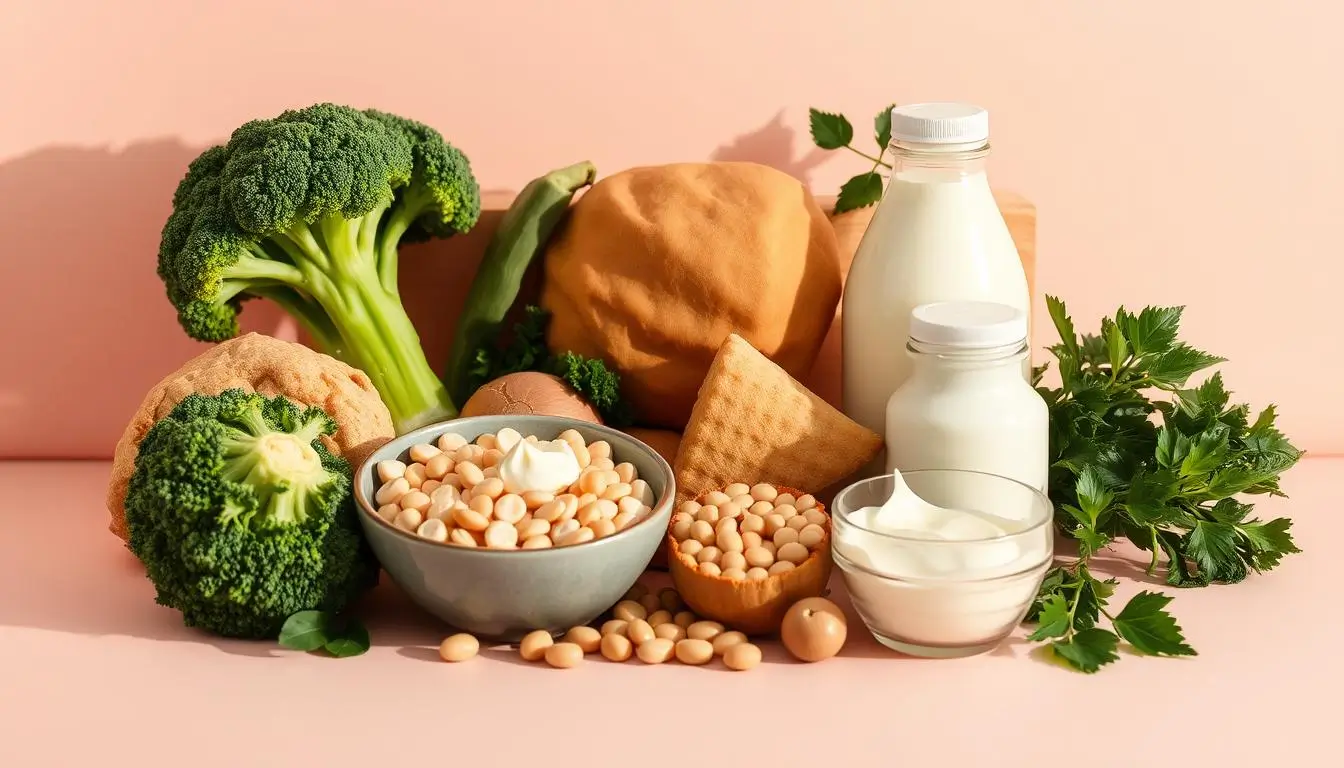
What Foods Cause Gas in Breastfed Babies? As a breastfeeding mom, you might worry about your baby’s health. Gas is a common issue that can upset your little one. Some foods eaten by the mother can upset a breastfed baby’s stomach.
It’s important to know how your diet affects your baby’s digestion. We’ll look at how certain foods can make gas in breastfed babies. Knowing this can help you choose better foods for yourself.
Key Takeaways
- Maternal diet plays a significant role in breastfed babies’ digestive health.
- Certain foods can cause gas in breastfed infants.
- Awareness of these foods can help mothers adjust their diet.
- Breastfeeding mothers should monitor their baby’s reaction to different foods.
- Adjusting the mother’s diet can alleviate gas issues in breastfed babies.
🍼 Nourish Your Little One with Healthy Baby Food – Shop Top Brands on Amazon
When it comes to feeding your baby, you want the best — and that means choosing baby food that’s nutritious, delicious, and easy to prepare. From first foods to stage-based meals, Amazon has a wide range of trusted, parent-approved baby food options to support your baby’s growth and development.
🥕 Organic purees and wholesome snacks
🍌 Convenient jars, pouches, and finger foods
🍏 Stage 1, 2, and 3 baby food for every feeding milestone
👉 Shop healthy baby food on Amazon
✔️ Trusted brands like Gerber, Happy Baby, Earth’s Best & more
✔️ Made with organic ingredients and no artificial additives
✔️ Fast delivery and bulk options for savings
Give your baby the best start with nutritious, safe, and tasty food — all from top-rated brands. 💖
The Connection Between Your Diet and Your Baby’s Digestive System
As a breastfeeding mom, what you eat affects your baby’s comfort and digestion. The nutrients and proteins from your food go into your breast milk. This affects your baby’s digestive health.
How Food Components Transfer Through Breast Milk
Breast milk changes based on what you eat. Proteins, sugars, and other nutrients from your diet are in the breast milk. This gives your baby the nutrients they need. But, some foods can make your baby sensitive or allergic, causing gas and discomfort.
The way food moves from you to your baby through breast milk is complex. It depends on what you eat and how your body processes it. For example, eating dairy can put dairy proteins in your breast milk. This might bother a baby who is sensitive to dairy.
Why Some Babies Are More Sensitive Than Others
Babies can react differently to what’s in breast milk. Some babies get more gas and discomfort because their digestive systems are not fully developed. Their age, health, and genetics also play a part in how they react to your diet.
The bacteria in a baby’s gut is important for their digestion. It can be affected by what you eat. Eating a balanced diet can help keep your baby’s gut healthy. This might lower the chance of gas and other digestive problems.
Signs Your Breastfed Baby Is Experiencing Gas
As a parent, knowing the signs of gas in your breastfed baby is key. Gas can make your baby very uncomfortable. Spotting its symptoms is the first step to easing their pain.
Physical Symptoms to Watch For
Babies who are breastfed and have gas may show certain signs. These include:
- A swollen or hard abdomen
- Fussiness during or after feeding
- Passing gas frequently
- Drawing up of the legs towards the abdomen
These signs suggest your baby might be struggling with gas. If you see any, it’s a good idea to look for ways to help with baby gas relief.
Behavioral Changes That Indicate Discomfort
Babies with gas issues might also act differently. They might:
- Increased crying or fussiness
- Difficulty sleeping or staying asleep
- Restlessness or irritability
Spotting these changes can help you figure out if gas is bothering your baby. Changing your diet to avoid gassy foods to avoid could be a good first step.
What Foods Cause Gas in Breastfed Babies: The Top 7 Culprits
The diet of a breastfeeding mother greatly affects her baby’s digestion. Some foods can pass through breast milk and cause gas, discomfort, or allergies in infants. Knowing which foods can cause these problems helps mothers choose their diet wisely.
Dairy Products and Lactose
Dairy products often cause gas in breastfed babies. Proteins from cow’s milk, like casein and whey, can get into breast milk. Some babies might be sensitive to these proteins, leading to gas, fussiness, or other digestive issues.
Cruciferous Vegetables
Vegetables like broccoli, cabbage, and cauliflower are good for health but can cause gas in some breastfed babies. They contain raffinose, a complex sugar hard for some to digest. When these compounds get into breast milk, they might cause gas or discomfort in sensitive infants.
Beans and Legumes
Beans and legumes can also cause gas in breastfed babies. They contain complex sugars that are hard to digest. Foods like beans, lentils, and peas can cause gas in mothers, and this discomfort can be passed to their babies through breast milk.
Certain Fruits
Some fruits can cause gas or discomfort in breastfed babies. Citrus fruits, berries, and prunes are examples. The high acidity or certain compounds in these fruits can be passed through breast milk, potentially causing digestive issues in sensitive babies.
Spicy Foods and Strong Seasonings
Spicy foods and strong seasonings can also affect breastfed babies. Compounds that give foods their spicy or strong flavors can pass into breast milk. Some babies might react to these compounds with gas, fussiness, or other signs of discomfort.
Caffeine and Chocolate
Caffeine and chocolate contain stimulants that can affect breastfed babies. Caffeine can pass into breast milk and might cause irritability, fussiness, or gas in some infants. Similar compounds in chocolate can sometimes lead to digestive discomfort.
Artificial Sweeteners and Preservatives
Artificial sweeteners and preservatives can also cause issues in breastfed babies. Some artificial sweeteners can be difficult for infants to digest, leading to gas or other digestive problems.
To better understand the impact of these foods, let’s look at a summary:
| Food Category | Examples | Potential Effects |
|---|---|---|
| Dairy Products | Milk, Cheese, Yogurt | Gas, Fussiness |
| Cruciferous Vegetables | Broccoli, Cabbage, Cauliflower | Gas, Discomfort |
| Beans and Legumes | Beans, Lentils, Peas | Gas, Digestive Issues |
| Certain Fruits | Citrus Fruits, Berries, Prunes | Gas, Digestive Discomfort |
| Spicy Foods and Seasonings | Hot Peppers, Garlic, Onions | Fussiness, Gas |
| Caffeine and Chocolate | Coffee, Tea, Chocolate | Irritability, Gas |
| Artificial Sweeteners and Preservatives | Sugar Substitutes, Food Additives | Gas, Digestive Issues |

By knowing these common culprits, breastfeeding mothers can make better choices about their diet. This helps minimize discomfort in their babies.
Managing Gas Issues and Finding Relief
Dealing with gas in breastfed babies can be tough. But, there are ways to make it better. By knowing what causes it and making a few changes, moms can help their babies feel better. This makes feeding time more enjoyable for everyone.

Keeping a Food Diary to Identify Triggers
Keeping a food diary is a smart move to tackle gas issues. It helps track which foods might be causing trouble. By noting down what’s eaten and how the baby reacts, moms can spot patterns. This way, they can figure out which foods to avoid.
Effective Baby Gas Relief Techniques
There are many ways to ease baby gas relief. Gentle massage, warm baths, and gas drops are good options. Moms can also try pacifiers or warm compresses to comfort their little ones.
Proper Feeding Positions to Minimize Gas
The way a baby is held during feeding matters. Trying different breastfeeding positions can help. The “laid-back” or “upright” positions might work best. They help reduce air swallowing.
When to Consult Your Pediatrician
If gas problems don’t go away or are serious, see a pediatrician. They can give advice tailored to your baby. They’ll also check for any other health issues that might be causing the discomfort.
Understanding the Impact of Breastfeeding on Baby Gas
A mother’s diet greatly affects her baby’s digestive health, including gas issues. Knowing the signs of gas, like discomfort and changes in behavior, is key. This helps mothers start managing these problems.
Some foods can make gas worse in breastfed babies. These include dairy, cruciferous veggies, beans, and spicy foods. By keeping a food diary, mothers can find out which foods upset their baby. This helps them make better diet choices.
To help with gas, mothers can try different feeding positions and gas relief methods. If needed, talking to a pediatrician is also a good step. Making changes in diet and feeding can greatly help a baby’s comfort and health while breastfeeding.
FAQ
What are the most common foods that cause gas in breastfed babies?
Foods like dairy, broccoli, and cabbage can cause gas. Beans, legumes, citrus fruits, and spicy foods also play a role. Caffeine and chocolate can pass into breast milk and upset sensitive babies.
How do I know if my breastfed baby is experiencing gas due to my diet?
Look for signs like bloating and discomfort. Also, watch for changes in stool and mood swings. If you see these signs, it might be your diet.
Can I continue breastfeeding if my baby is gassy?
Yes, keep breastfeeding. It’s good for your baby’s health. Just try to avoid foods that make your baby gassy.
How can I relieve my baby’s gas discomfort?
Try a food diary to track what makes your baby gassy. Use methods like bicycling their legs or warm baths. Also, change how you feed them to reduce gas.
Are there any breastfeeding diet tips that can help minimize gas in my baby?
Yes, watch what you eat and avoid gassy foods. Eat whole foods and drink plenty of water. For more advice, talk to a healthcare professional or dietitian.
What foods should I avoid while breastfeeding to prevent gas in my baby?
Be careful with foods like dairy, broccoli, and spicy foods. Try cutting back on these to see if it helps your baby feel better.
When should I consult my pediatrician about my baby’s gas issues?
If your baby’s gas is bad or comes with other symptoms like vomiting, see your pediatrician. They can check for health problems and offer advice.







